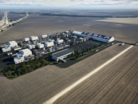Turning Tesla into a global electrification conglomerate

The surge of interest in the electric vehicle (EV) industry has only played into the hands of the pure-play car maker Tesla as it sees growth across various sectors relating to electrified transportation.
Despite its CEO’s diverted attention towards various other projects, such as his SpaceX endeavours and the acquisition of Twitter, Tesla continues to grow beyond its manufacturer status to become a business that seemingly be self-sufficient in the growing EV market.
It all started with the development of electric cars with the first ones, the Tesla Roadster, commercially available in 2008—the year following Elon Musk’s appointment as CEO. From there on Tesla expanded its footprint with a number of service centres and 438 stores across the US and China. While the company wasn’t the one to invent the EV, it most certainly played a significant role in bringing the movement to fruition.
While the first car was significantly higher in price than those on the market today, the product was a huge step towards the global rollout of EVs, which catalysed the development of the existing models.
Now this business is up there with the traditional OEMs and is battling it out with the Chinese EV maker, BYD, for the leading position in the sector. Both companies have shown significant growth interest in each other’s territories, making them global players with high output capabilities. From Tesla’s perspective, this looks like more than 422,000 vehicle sales in Q1 2023 alone, amounting to more than US$23bn in revenue this year.
But there’s one advantage that BYD has, which was announced in 2018. The news being that the company had the deeds to the largest lithium-ion battery manufacturing plant in the world.
Knowing that China is responsible for the majority of battery production globally, the Tesla CEO bridged an outsourced gap in its supply chain with the development of the company’s own gigafactory to produce its own batteries in an effort to bring down the cost of manufacturing its cars—and inherited more control over its supply chain.
Tesla’s expands its supply chain control
Having dominated the EV industry for a while, and localising its battery production, Tesla is looking to branch out further along its upstream supply chain as it announces it has broken ground on its own lithium refinery. The company will invest a significant US$375 million into its plant, which will be based near Corpus Christi, Texas, with the aim of internalising production of lithium for its batteries.
According to Musk, once completed, the new plant will produce enough lithium to supply one million new vehicles each year, which will make the company self-sufficient in its EV production and cost-effective in manufacturing new zero-emission vehicles.
Tesla will gain more control over its entire production cycle, making it more involved in the product life cycle of its vehicles, which will not only serve the needs of its customers, but the planet as a whole.
Tesla is tackling some of the many challenges faced in electrification as an industry challenge across many sectors, including renewable energy and battery storage solutions, which will provide the backbone of an all-electric future. Likewise Tesla is also heavily involved in technology development and autonomous driving systems, which can benefit users from a safety and insurance perspective, but also ensure the longevity of Tesla vehicles.
What was seen as a pioneer in the EV space has now become a multi-industry conglomerate with a foot in automotive, energy, technology, and robotics, which will shape the future of more than just mobility.
- Aramco's Bold Shift: Powering the Future of EVsMobility
- Voltpost Secures Grants for Nationwide Lamppost EV ChargersCharging & Infrastructure
- San Francisco Expands Curbside EV Charging ProgrammeCharging & Infrastructure
- How Amazon hit one Billion Electric Deliveries in the USFleet & Commercial


